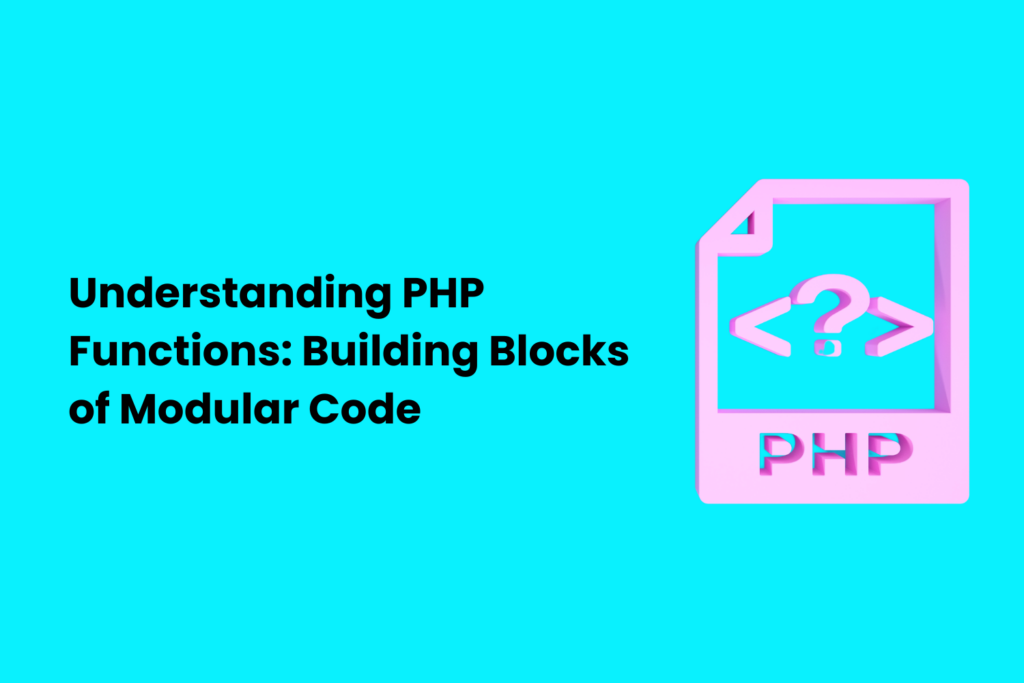Understanding PHP Functions: Building Blocks of Modular Code

Understanding PHP Functions: Building Blocks of Modular Code
In any Programming Course, mastering the concept of functions is crucial for writing clean, efficient, and maintainable code. In PHP, functions play a fundamental role in breaking down complex tasks into smaller, reusable modules, making code more organized and easier to manage. In this blog, we explore PHP Function, their syntax, usage, and best practices for building modular and efficient code.
Table of Contents
What are PHP Functions?
A function in PHP is a segment of code that may be used repeatedly in a program to carry out a particular activity. Using functions, you may condense a collection of instructions into a single unit that can be invoked from any point in your code. Using a modular programming approach reduces the duplication in your code, makes it simpler to maintain, and produces fewer errors.
Syntax of PHP Functions
In PHP, creating a function follows a simple syntax. The function keyword comes first, then the function name and any arguments it takes. You write the code that specifies the behaviour of the function inside of it. Once a function is created, you may run the code inside by calling it by name.
Passing Parameters to PHP Functions
When a PHP function is called, it may take arguments and variables provided. Your functions may be more versatile by using parameters that let them operate with a range of input values. When defining a function, you may provide arguments that will be used to receive values when the function is called.
Return Values in PHP Functions
The return keyword in PHP functions may also be used to return values. This makes it possible for functions to compute a result and return it to the calling code. You have two options when a function returns a value: you may utilise it immediately in your code or save it in a variable.
Defining PHP Functions
When creating a function in PHP, the function keyword must be used with the function’s name and any required arguments. Curly braces {} contain the function’s body, which houses the code logic. This structure encourages code reusability and maintainability by encapsulating a series of operations into a reusable unit.
Calling PHP Functions
Once declared, a function may be called from anywhere in the code using its name and brackets (). If the function needs input arguments, they are given in parentheses. A function’s body of code is executed when called, enabling the application to reuse its declared logic.
Built-in PHP Functions
A huge range of built-in functions in PHP are available for various activities, ranging from simple ones like mathematical computations and text manipulation to more intricate ones like file management and database interfaces. Because these built-in functions provide pre-written solutions to typical programming problems, developers may easily utilise them in PHP code, saving time and effort.
Anonymous Functions (Closures)
PHP allows anonymous, commonly called closures and named functions. Anonymous functions may be supplied as arguments to other functions or assigned to variables since they don’t have a name. They are handy for developing quick, inline functions or constructing PHP callback functions.
Function Parameters in PHP
In PHP, functions can accept parameters, which are variables passed to the function when it is called. These parameters allow functions to work with different data values each time they are called, increasing their flexibility and usefulness in various contexts.
Returning Values from PHP Functions
PHP functions can also return values using the return keyword. This allows functions to calculate a result and pass it back to the code that called the function. Returning values from functions enables the use of the function’s output in other parts of the code, making functions more versatile and powerful.
Conclusion
PHP functions are fundamental components of modular web development code. You can build simpler code to read, maintain, and organise by encapsulating reusable functionality inside functions. Any programmer who can design and utilise PHP functions will be able to develop more effective and scalable PHP applications. This is a vital skill that should be mastered.
Lucas Noah, with a Bachelor of Information Technology (BIT) degree, is a prolific writer known for his expertise in the tech world. Currently, he brings his wealth of knowledge to Creative Outrank LLC and Oceana Express LLC, enriching their websites with hi... Read more


